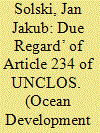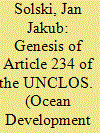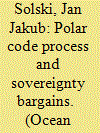| Srl | Item |
| 1 |
ID:
188220


|
|
|
|
|
| Summary/Abstract |
Article 234 of UNCLOS is in many ways exceptional, but it is not unique in the sense that it grants to the coastal state “complete” legislative power. Arguably, “complete” coastal state jurisdiction exists in the territorial sea for the purposes enumerated in Article 21(1), allowing coastal states to adopt ship reporting systems, pilotage, and other routing measures unilaterally. The analysis of state practice reveals that states often decide to engage the International Maritime Organization (IMO) in different ways, even when such a course of action is not mandatory. This article advocates for meaningful deliberation as both a suitable method of meeting Article 234’s due regard standard, and a practice that can be expected from a steward.
|
|
|
|
|
|
|
|
|
|
|
|
|
|
|
|
| 2 |
ID:
178618


|
|
|
|
|
| Summary/Abstract |
Article 234 is exceptional regarding its wording and placement in the United Nations Convention on the Law of the Sea (UNCLOS), as well as in its historical background. The Arctic provision has given rise to divergent interpretations regarding the conditions for invoking it, the limitations on the authority under Article 234, and its spatial scope of application. It has served as a justification for specific legislation adopted by Canada and Russia that has been opposed by the United States. The article, describes as a “textbook example of finding a compromise in international treaty negotiations,” was negotiated directly and privately, among these three states during the Third United Nations Conference on the Law of the Sea (UNCLOS III). This article describes the historical background to Article 234 and sheds new light on the negotiating process that led to the adoption of the provision.
|
|
|
|
|
|
|
|
|
|
|
|
|
|
|
|
| 3 |
ID:
190648


|
|
|
|
|
| Summary/Abstract |
Owing to a shift from the culture of compliance to the culture of benchmarking, the Polar Code process of ensuring safe operation and environmental protection in Polar waters is still ongoing. The risk and goal-based approaches embedded in significant parts of the Polar Code invite different stakeholders to participate in the development of Arctic shipping governance. The methodology used in the process, such as POLARIS, may serve as a common baseline, but its utility relies on further updates and validation. The reliability of decision-support systems depends largely on whether different stakeholders embrace the system and share their experiences to facilitate systematic updates. This article compares the approaches of the two major coastal states, Canada and Russia, to POLARIS as reflected in their coastal state systems of shipping control in the Canadian Arctic Waters and the Russian Northern Sea Route (NSR). Considering that much Arctic shipping occurs within the Canadian Arctic and the NSR, their regulatory approaches may affect POLARIS’s popularity, acceptance, and, eventually, success in providing a common regulatory baseline.
|
|
|
|
|
|
|
|
|
|
|
|
|
|
|
|